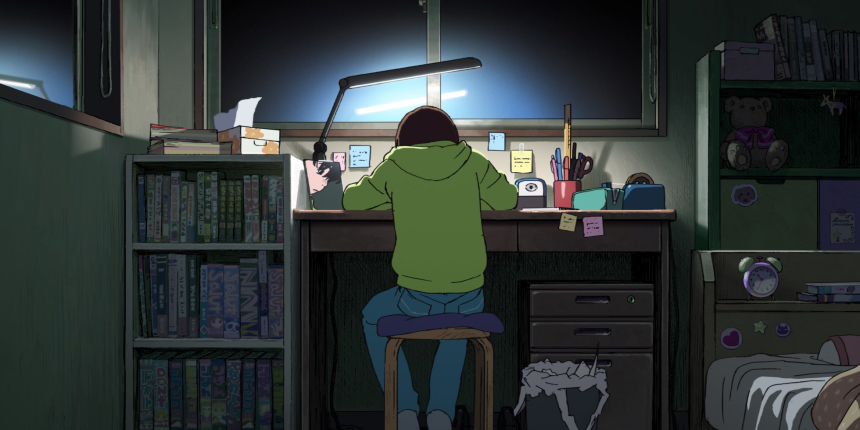LOOK BACK Review: Emotionally and Visually Beautiful Film, Undone by Melodrama

It's no wonder that Look Back is highly anticipated by anime fans.
The film is based on the manga of the same name by Chainsaw Man creator Tatsuki Fujimoto and is directed by Kiyotaka Oshiyama, whose resume includes working with anime legends Miyazaki and Anno, as well as directing an episode of Devilman Crybaby. But while the creators' past projects may pique interest, Look Back is very different from Chainsaw Man and Devilman Crybaby.
The story centers on two young amateur mangaka with dreams of making it big, following the ups and downs of their careers and relationship. Amuyu Fujino (Yumi Kawai) is a "successful" mangaka at her middle school; she writes and draws the four-panel comic that appears regularly in the school paper and is well-complimented by her peers.
She's talented and cares about her work; an early long-held static shot shows her sitting at her desk thinking for a while before setting pencil to paper. But she's also far more arrogant than she is skilled. It's a truth that she has to come to terms with when she sees art by her schoolmate Kyomoto, an agoraphobic student who "attends" school from home. A few plot beats later, the two are creating together and begin a successful partnership.
In its first 40 minutes, Look Back is a beautifully drawn (figuratively and literally) story about two artists coming together and making each other better, while working through, or not working through, the difficulties of creative collaboration. Because the movie is full of sometimes jarring time jumps, allowing it to tell a years-long story in an hour, the images that Oshiyama spends time on speak volumes.
Early on, we see Fujino sitting at her desk honing her skills as the sun rises and sets, and seasons change outside her window. Later, we see similar background changes as the girls share the space of Fujino's room, with Fujino still at her desk and Kyomoto sitting on the floor, using a coffee table for her drawings. Montages throughout highlight small moments of friendship, from the shared joy of tweens discovering new things together to older teens quietly enjoying each other's company.
The entire movie looks fantastic, especially the relationship of natural light to our characters, whether through windows or in open fields. And early scenes shift into alternate art styles to bring Fujino and Kyomoto's in-universe artwork to life. Fujino's art is flat, angular, and cutely charming. Kyomoto's art is moodier, rendered in what looks like a combination of crayons, pastels, and watercolors. It's one of the film's great disappointments that we never get to see the art they create together.
The greatest disappointment, though, is the absurd turn of the narrative's final third. The movie shifts sharply from a lovely story of young friendship into something bewilderingly brutal and then attempts to use that cruelty to lend power to the beauty of what came before.
It's part of a trend in anime that has its admirers, but never fails to ring hollow to me. The beats are familiar and exhausting: introduce something beautiful, cruelly tear it down, and pump the finale full of images of the good times bolstered by a swelling score of piano and strings to make sure the audience weeps.
For anime fans that enjoy this trend, Look Back may be a success, but for this fan of Fujimoto's work on Chainsaw Man, Look Back begins brilliantly before falling prey to one of the worst fads of the last decade.
The film is now playing in select theaters in New York and Los Angeles. It opens in theaters nationwide October 6 and 7, all via GKids. Visit their official site for more information.







